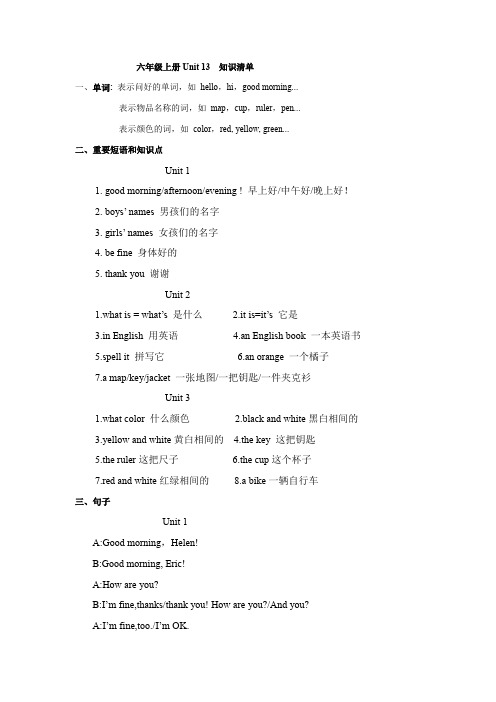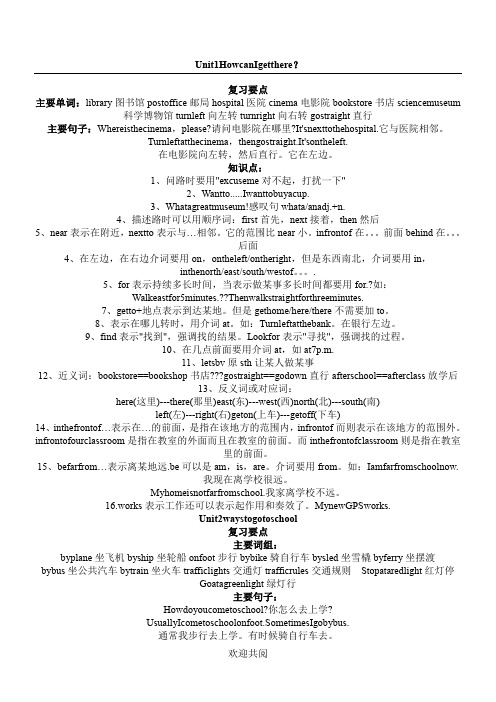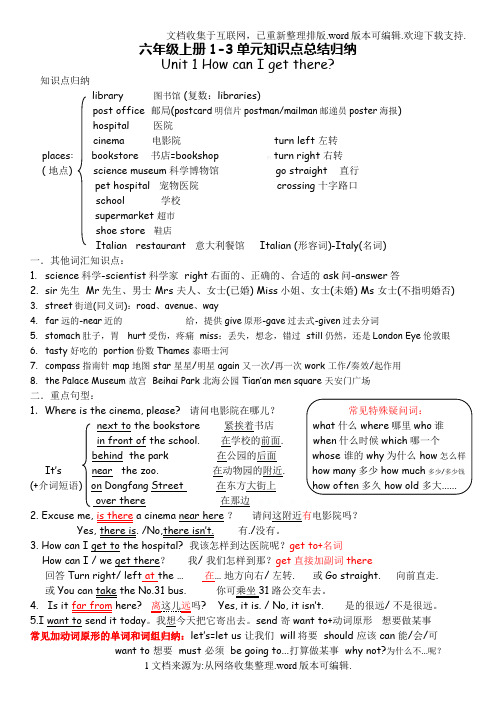(完整版)小学六年级英语考点归纳U1-U3
- 格式:doc
- 大小:18.77 KB
- 文档页数:4

六年级上册Unit 13 知识清单一、单词: 表示问好的单词,如hello,hi,good morning...表示物品名称的词,如map,cup,ruler,pen...表示颜色的词,如color,red, yellow, green...二、重要短语和知识点Unit 11. good morning/afternoon/evening ! 早上好/中午好/晚上好!2. boys’ names 男孩们的名字3. girls’ names 女孩们的名字4. be fine 身体好的5. thank you 谢谢Unit 21.what is = what’s 是什么2.it is=it’s 它是3.in English 用英语4.an English book 一本英语书5.spell it 拼写它6.an orange 一个橘子7.a map/key/jacket 一张地图/一把钥匙/一件夹克衫Unit 31.what color 什么颜色2.black and white黑白相间的3.yellow and white黄白相间的4.the key 这把钥匙5.the ruler这把尺子6.the cup这个杯子7.red and white红绿相间的8.a bike一辆自行车三、句子Unit 1A:Good morning,Helen!B:Good morning, Eric!A:How are you?B:I’m fine,thanks/thank you! How are you?/And you?A:I’m fine,too./I’m OK.A:早上好,海伦!B:早上好,埃里克!A:你好吗?B:我很好,谢谢。
你呢A:我也很好。
Unit 2A:What’s this in English?B:It’s a jacket.A:What’s that in English?B:It’s an orange.A:Spell it,please.B:ORANGE.A:这个用英语怎么说?B:它是一件夹克衫。

六年级上册英语知识点总结Unit 1 How can I get there一:重点单词和短语Science科学museum博物馆post office邮局bookstore书店cinema电影院hospital医院London Eye伦敦眼stomach胃crossing十字路口turn left向左转turn right向右转next to紧挨着/与...相邻far from(离...远) near在...附近behind(在...后面)in front of(在...前面)between…and…(在...和...之间)go straight=walk straight直走二:按要求写单词:hot(反义词)cold cool(反义词)warm too(同音词)to/two can not(缩写)can’t????? right(反义词)left/wrong buy(同音词)by/bye sea(同音词)see first(基数词)one???? four(序数词)fourth did (原形)do /does three(序数词)third give(过去式)gave三:重点句型分析1.?Where is the museum shop此问句是由特殊疑问词where 引导的一个特殊疑问句,where意为“在哪里,到哪里”,用来询问地点,放在句子的开头。
询问“某人或某物在哪里”的基本句型是:“ Where +is/are+ 主语?”,where is 后接名词或代词的单数形式,where are 后接名词或代词的复数形式。
表示地点的词:museum博物馆, post office邮局, bookstore书店, cinema电影院, hospital医院restaurant 餐馆bank银行bus stop公交车站lake湖library图书馆zoo动物园school学校park公园garden 花园hotel旅馆2.?It’s near the door.?此句中near是表示位置的介词,意为“旁边,附近” ,其同义句是:It’s next to the door.它在门的旁边。

Unit1HowcanIgetthere?复习要点主要单词:library图书馆postoffice邮局hospital医院cinema电影院bookstore书店sciencemuseum 科学博物馆turnleft向左转turnright向右转gostraight直行主要句子:Whereisthecinema,please?请问电影院在哪里?It'snexttothehospital.它与医院相邻。
Turnleftatthecinema,thengostraight.It'sontheleft.在电影院向左转,然后直行。
它在左边。
知识点:1、问路时要用"excuseme对不起,打扰一下"2、Wantto.....Iwanttobuyacup.3、Whatagreatmuseum!感叹句whata/anadj.+n.4、描述路时可以用顺序词:first首先,next接着,then然后5、near表示在附近,nextto表示与…相邻。
它的范围比near小。
infrontof在。
前面behind在。
后面4、在左边,在右边介词要用on,ontheleft/ontheright,但是东西南北,介词要用in,inthenorth/east/south/westof。
.5、for表示持续多长时间,当表示做某事多长时间都要用for.?如:Walkeastfor5minutes.??Thenwalkstraightforthreeminutes.7、getto+地点表示到达某地。
但是gethome/here/there不需要加to。
8、表示在哪儿转时,用介词at。
如:Turnleftatthebank。
在银行左边。
9、find表示"找到",强调找的结果。
Lookfor表示"寻找",强调找的过程。
10、在几点前面要用介词at,如at7p.m.11、letsbv原sth让某人做某事12、近义词:bookstore==bookshop书店???gostraight==godown直行afterschool==afterclass放学后13、反义词或对应词:here(这里)---there(那里)east(东)---west(西)north(北)---south(南)left(左)---right(右)geton(上车)---getoff(下车)14、inthefrontof…表示在…的前面,是指在该地方的范围内,infrontof而则表示在该地方的范围外。

六年级上册Unit 1 How can I get there?表示具体地点的词语:城市c i ty、乡村v i llage、学校sch oo l、公园p ar k、动物园z oo、邮局post office、电影院cinema、医院h o spital、宠物医院pet hospital、书店b oo kstore、科学博物馆science museum、十字路口cr o ssing (at +具体地点例如:at the zoo)表示方位的词语:在…旁边next to、在…旁边beside、在…附近near、在…前面in front of、在…后面behind、在…中间between…and…、在左边on the left of、在右边on the right 、在那儿over there 在十字路口at the crossing向左转turn left、向右转turn right、直行go straight1.表示某地有某建筑物用There be 句型:There is a cinema. 这里有一个电影院。
一般疑问句:Is there a cinema ? 这里有电影院吗?2.询问某地在哪儿用特殊疑问词Where:Where is the cinema? It’s next to the bookstore.电影院在哪里?它在书店隔壁。
3.表示两建筑物间的位置关系用方位词语:The bookstore is next to the cinema. 书店在电影院旁边。
4.询问怎样到达某地:How can I get to the bookstore? Turn left at the cinema. 我怎样到达书店?在电影院左转.(如果get 后面接的是地点副词如:there 、home等不用加to例如:How can I get there)5.Turn right at the hospital. 在医院右转。

部编版六年级上册英语全册知识点考点归纳一. Unit 1: Greetings and Introductions- 主要知识点:问候语和自我介绍的表达方式、对话中的礼貌用语等。
- 考点:熟练运用问候语和自我介绍的句型进行实际对话。
二. Unit 2: Daily Routines- 主要知识点:日常活动及时间的表达法、动词的第三人称单数形式、频度副词等。
- 考点:能够描述自己和他人的日常活动,并用适当的频度副词表达频率。
三. Unit 3: Hobbies and Interests- 主要知识点:各类爱好和兴趣的词汇,运动动词的搭配等。
- 考点:能够谈论自己的爱好和兴趣,并用动词的适当形式表达。
四. Unit 4: School Life- 主要知识点:学校生活相关的词汇、句型及日常用语。
- 考点:根据提供的情境,能流利用英语进行交流,描述学校生活的一般情况。
五. Unit 5: Family and Homes- 主要知识点:家庭成员及房屋相关的词汇、形容词的比较级和最高级等。
- 考点:描述家庭成员和房屋的外貌、特点及家人之间的关系,掌握形容词的比较级和最高级的使用。
六. Unit 6: Daily Life- 主要知识点:购物和衣物相关的词汇、句型及日常用语等。
- 考点:能够根据给定的情境,进行购物和衣物方面的交流,描述自己和他人的穿着。
七. Unit 7: Food and Drinks- 主要知识点:食物和饮料相关的词汇、数量词、可数名词和不可数名词等。
- 考点:能够描述所喜欢的食物和饮料,并用数量词正确表达数量。
八. Unit 8: Festivals and Celebrations- 主要知识点:节日和庆祝活动的词汇、句型及常用表达方式等。
- 考点:能够流利描述不同节日和庆祝活动,并参与与之相关的英语对话。
以上是部编版六年级上册英语全册的知识点和考点归纳。
希望对你的学习有帮助!。

文档收集于互联网,已重新整理排版.word版本可编辑.欢迎下载支持.六年级上册1-3单元知识点总结归纳Unit 1 How can I get there?知识点归纳library 图书馆 (复数:libraries)post office 邮局(postcard明信片postman/mailman邮递员poster海报)hospital 医院cinema 电影院 turn left 左转places: bookstore 书店=bookshop m turn right 右转( 地点) science museum科学博物馆 go straight 直行pet hospital 宠物医院 crossing 十字路口school 学校supermarket 超市shoe store 鞋店Italian restaurant 意大利餐馆 Italian (形容词)-Italy(名词)一.其他词汇知识点:1.science科学-scientist科学家 right右面的、正确的、合适的 ask问-answer答2.sir先生 Mr先生、男士 Mrs 夫人、女士(已婚) Miss小姐、女士(未婚) Ms 女士(不指明婚否)3.street街道(同义词):road、avenue、way4.far远的-near近的给,提供 give原形-gave过去式-given过去分词5.stomach肚子,胃 hurt受伤,疼痛 miss:丢失,想念,错过 still仍然,还是London Eye伦敦眼6.tasty 好吃的 portion份数Thames 泰晤士河pass指南针 map 地图 star 星星/明星 again 又一次/再一次 work 工作/奏效/起作用8.the Palace Museum 故宫 Beihai Park 北海公园 Tian’an men square 天安门广场二.重点句型:1.Where is the cinema, please? 请问电影院在哪儿?next to the bookstore 紧挨着书店in front of the school. 在学校的前面. whenbehind the park 在公园的后面 whoseIt’s near the zoo. 在动物园的附近. how many(+介词短语) on Dongfang Street 在东方大街上 how oftenover there 在那边2. Excuse me, is there a cinema near here ?请问这附近有电影院吗?Yes, there is. /No,there isn’t.有./没有。
六年级上册一到三单元英语笔记Unit 1 How can I get there?一、重点单词。
1. science museum(科学博物馆)- “science”是“科学”的意思,例如:Science helps us understand the world better.(科学帮助我们更好地理解世界。
)- “museum”是“博物馆”,可数名词。
2. post office(邮局)- “post”有“邮政、邮寄”的意思,“office”是“办公室”,合起来就是办理邮政业务的地方。
3. bookstore(书店)- 由“book(书)”和“store(商店)”组成。
4. cinema(电影院)- 去电影院看电影可以说“go to the cinema”。
5. hospital(医院)- 如果说“in the hospital”,表示在医院里(不一定是生病住院,可能是看望病人或者在医院工作等);“in hospital”则表示生病住院。
6. crossing(十字路口)- 是“cross(穿过)”的名词形式,例如:Turn left at the second crossing.(在第二个十字路口左转。
)7. turn(转弯)- 常见搭配:“turn left(左转)”“turn right(右转)”“turn around (转身)”。
8. left(左边)- 反义词是“right(右边)”,例如:The bookstore is on the left.(书店在左边。
)二、重点短语。
1. near(在……附近)- 例如:My home is near the school.(我的家在学校附近。
)2. next to(紧挨着)- 它比“near”表示的距离更近,如:The library is next to the post office.(图书馆紧挨着邮局。
)3. in front of(在……前面)- 注意与“in the front of”的区别,“in the front of”表示在物体内部的前面,例如:The teacher stands in the front of the classroom.(老师站在教室的前面,是在教室内部);而“in front of”是在物体外部的前面,如:There is a tree in front of the house.(房子前面有一棵树)。
人教版六年级上册英语1-3单元知识归纳Unit 1:In the first unit, we learn about personal information and greetings. We learn how to introduce ourselves and ask others for their names. We also learn about nationality and how to say where we come from. Additionally, we learn how to greet others and how to say goodbye. We practice simple conversations using these phrases and learn how to express basic needs and preferences.Unit 2:In the second unit, we focus on classroom objects and school subjects. We learn the names of common objects found in a classroom such as books, pens, desks, and chairs. We also learn the names of different school subjects like math, science, and English. Additionally, we learn how to talkabout our schedule or timetable and express what subjects we have on certain days.Unit 3:The third unit is all about hobbies and free time activities. We learn how to talk about our favorite hobbies and activities. We learn vocabulary related to sports, music, and games. We also learn how to express our likes anddislikes using "I like" and "I don't like" phrases. Moreover, we learn how to ask others about their hobbies and engage in simple conversations about our common interests.Throughout these units, we practice listening, speaking, reading, and writing skills. We engage in various activities such as role-plays, pair work, and group discussions to enhance our communication abilities. By the end of these units, we should be able to confidently introduce ourselves, communicate basic personal information, talk about school life, and discuss hobbies and interests.。
·小学六年级英语1-3单元知识点汇总Unit 1 How can I get there ?一.询问“如何到达…?”疑问词应该用how how= 如何,怎样How+ can + 主语+ get to +地点?如果后面的地点为here,there ,home 这三个地点副词时,to 省略。
一般回答为:“在某个地点左转、右转或直行”,需要注意介词用at .例如:1.How can I get ______ home ? A. to B. / C. a2.How can I get _______ the cinema ? A. to B. / C. a3.Turn right______ the traffic lights. A. in B. at C. on二.询问地点,用疑问词where “…在哪?”where=哪里Where is the + 地点?例如:1.医院在哪里? __________ is the hospital ?一般回答为“它是紧挨着…”或“它是在…附近”或“它是…的前面”“它是在…的后面”需要注意: 它=It , 是=is, 它是=It is =It’s2.它是紧挨着博物馆。
It’s __________ ________the museum.3.它是在书店附近。
It’s__________ the bookstore.4.它是在餐馆的前面It’s ________ ____________ __________ the restaurant .5.它是在超市的后面It’s ______________ the supermarket .三.There be 句型表示“有”There be 句型的一般疑问句就是将be动词提前,放在there 的前面。
肯定回答:Yes,there is . (单数) 或Yes,there are. (复数) 否定回答:No,there isn’t . (单数) 或No,there aren’t(复数)be 动词用is 还是are 取决于后面的名词是单数还是复数单数用is,复数用are,例如:1.There _______ a pet hospital in my city. 在我的城市有一家宠物医院。
六年级上册英语一到六单元知识总结Unit 1 How can I get there?一、重点单词。
1. 地点名词。
- science museum(科学博物馆),post office(邮局),bookstore(书店),cinema(电影院),hospital(医院),crossing(十字路口),turning(转弯处)等。
2. 方位介词及短语。
- near(在……附近),next to(紧挨着),in front of(在……前面),behind(在……后面),between…and…(在……和……之间)。
3. 动词短语。
- turn left(向左转),turn right(向右转),go straight(直走)。
二、重点句型。
1. - Where is the library?- It's near the post office.2. - How can I get to the hospital?- Turn left at the bookstore. Then go straight.三、语法点。
1. 特殊疑问句的用法:以特殊疑问词(where, how等)开头,用来询问地点、方式等信息。
2. 一般现在时在问路指路中的运用。
Unit 2 Ways to go to school.一、重点单词。
1. 交通工具名词。
- by bike(骑自行车),by bus(乘公共汽车),by train(乘火车),by plane(乘飞机),on foot(步行),ship(轮船),subway(地铁)等。
2. 形容词。
- slow(慢的),fast(快的)。
3. 其他。
- traffic(交通),traffic lights(交通灯),stop(停),wait(等)。
二、重点句型。
1. - How do you come to school?- Usually, I come on foot.2. - How can I get to the Fuxing Hospital?- Take the No. 57 bus over there.三、语法点。
小学六年级英语考点归纳U1-U3
Unit1 How tall are you?
1.形容词比较级的规则变化
1)普通+er long-longer
2)以e结尾+r cute-cuter
3)辅音字母加y结尾,把y改i 再加er heavy-heavier
4)重读闭音节,辅元辅结构双写+er thin-thinner
5)* 多音节及少数双音节,前加more beautiful-more beautiful *元音字母a e i o u 辅音字母剩下21个
2.形容词比较级结构
标志词than
1) A is +比较级+than B
Lily is taller than Tom.
2)I am +比较级+ than
I am heavier than you.
3)Your/My/Mike’s xxx+ is/are +比较级+ than mine/yours/Tom’s
Your feet are bigger than mine.
My legs are shorter than yours.
Mike’s fish is longer than Tom’s.
4)xxx is getting +比较级+and+ 比较级或xxx gets +比较级+and+比较级表越来越…His shadow is getting longer and longer.
The sun gets lower and lower.
3.问答整理
1)How tall are you?
I’m 1.61 meters./ I’m 1.61.
2)How old are you?
I’m 12 years old. / I’m 12.
3)How heavy are you?
I’m 40 kilograms. / I’m 40 kg.
4)What size are your shoes?
My shoes are size 37.
4.其他语法点
1)watch sb./sth. +动词原形
2)what后面接名词how后面接形容词
如:what size how old
3) they/we/you/名词复数后be动词用are
They are big and strong.
5.疑难单词
countryside 乡村
shadow 影子
smarter 更聪明的
both 两个都
become 变成
lower 更低的
hall 大厅
Unit2 Last weekend
1.动词过去式的规则变化
1)普通+ed clean-cleaned
3)以e结尾+d love-loved
3)辅音字母加y结尾,把y改i 再加ed study-studied 4)重读闭音节,辅元辅结构双写+ed stop-stopped
本书出现的不规则变化
have-had sleep-slept read-read see-saw ride-rode eat-ate take-took fall- fell buy-bought feel-felt think-thought hurt-hurt
2.否定句及疑问句
助动词do/does/did 后加动词原形
Did you go to school last Sunday?
She didn’t wash her clothes yesterday.
3.问答整理
1)What did you do last weekend?
I cleaned my room on Saturday.
2)Did you play football with Tom?
Yes, I did.
3)How was your weekend?
It was good/OK.
4.其他语法点
1)want to do sth. 想要做某事
I want to buy the new film magazine.
2)be动词过去式为was/ were
am/is-was
are-were
be 动词包括is/am/are/was/were
5.常见动词短语
cleaned my room washed my clothes stayed at home watched TV did something else saw a film with my friends read a book had a cold went fishing
6.疑难单词
before yesterday better broken
enjoy saw slept last
magazine
Unit 3 Where did you go?
1.其他语法点
1)xx looks like xxx 看起来像
It looks like a mule.
You look like your mother.
2)far from 远
Beijing is far from the USA.
2.问答整理
1)Where did you go?
I went to Dali with my parents.
2)Who did you go with?
My parents and my uncle.
3)What did you do there?
I rode a bike.
4)What happened?
I fell off my bike and hurt my foot.
3.常见短语
rode a horse rode a bike went camping hurt my foot
went fishing ate fresh food went swimming took pictures
bought gifts by plane lots of
4.疑难单词
went gift mule hurt pictures fell。